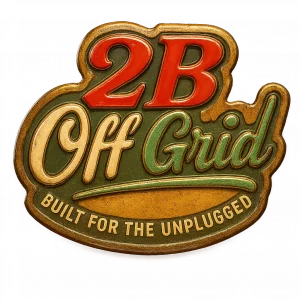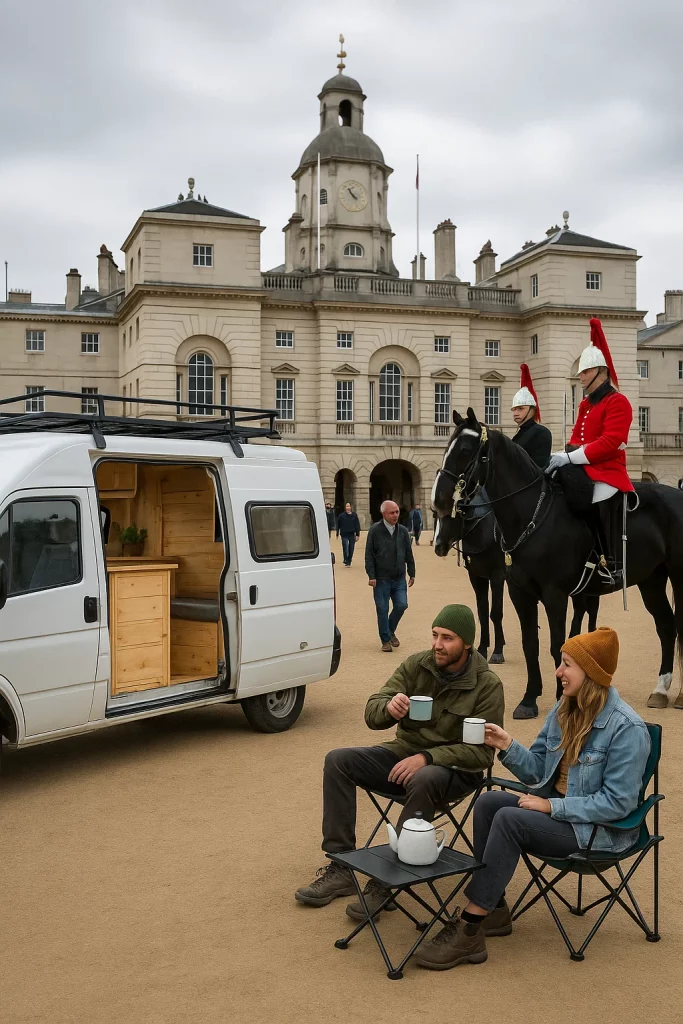
No Overnight Parking: UK Vanlife & Campervan Rules
- Vanlife
-
Aug 13
- Share post

No Overnight Parking: UK Vanlife & Campervan Rules
“I thought we could park anywhere in the UK?”
That’s the dream, isn’t it?
A van, a view, and the freedom to stop where you please. But if you’re living the vanlife in the UK — whether in a campervan, motorhome, or self-built off-grid wagon — you’ve probably met your fair share of laminated NO OVERNIGHT PARKING signs.
They’re in lay-bys, coastal car parks, even in the middle of nowhere where the sheep outnumber people. For vanlifers, it can feel personal. For councils, it’s just another way of keeping order. And stuck in the middle is the simple question: why all the bans, and who really benefits?
This isn’t a rant, and it’s not a cheerleader post either. It’s the first in a series looking at the overnight parking battle in the UK — through both windscreens.
Wild camping & overnight parking
In England and Wales, wild camping without landowner permission is technically illegal under the Criminal Justice and Public Order Act 1994 — except where local by-laws permit. Scotland has more relaxed rules under the Land Reform (Scotland) Act 2003.
Staying on council land
Some councils have Public Space Protection Orders (PSPOs) that allow them to fine for overnight parking in certain locations. Always check local signage — by-laws vary widely even within the same county.
Why Councils Restrict Overnight Parking
Councils don’t wake up one day and think, “How do we annoy vanlifers?” They respond to complaints: overflowing bins, blocked access for emergency services, or noise in sensitive areas.
Popular apps like Park4Night and the Motorhome & Campervan Bible have made once-secret spots public. One or two vans might blend in. Ten or twenty in a small car park? Suddenly it’s an “unauthorised site” without planning permission.
I remember a quiet Peak District lay-by last summer. Just two of us, surrounded by hills and birdsong. By nightfall, three more vans had arrived — all from the same app listing. It stayed peaceful, but I could feel the potential for a cluster. That’s the line councils watch closely.
The Vanlifer’s Side of the Story
Most of us aren’t trying to start a permanent settlement. We’re travellers, remote workers, retirees — people who want somewhere safe and legal to sleep. Campsites can be pricey, fully booked, or nowhere near the places we actually want to visit.
Many of us follow the “leave no trace” rule. The frustration comes when a few bad actors ruin it for everyone else. And when councils respond with blanket bans, it pushes the rest of us into stealth camping — which often just makes the cycle worse.
Aires: A European Inspiration
In parts of Europe, “aires” are designated overnight stops for motorhomes — often cheap or free, funded by local tourism. Some UK councils have trialled similar setups in Scotland and Cornwall.
The concept is simple: safe, legal spots with basic facilities. The challenge? Cost, land use, and duty of care. Councils take responsibility for maintenance, safety, and waste disposal. And there’s always the question: will it attract people outside the usual vanlife community, creating a management headache?
The trials are small-scale so far, but they show what could work if we can prove the model sustainable and respectful.
The Knock on the Door
Every vanlifer knows it — that dreaded “knock-knock” at 2 a.m. Legally, you can’t just sleep anywhere overnight. Public land, lay-bys, or common land? You need permission, or you risk being moved on. Private land? Same deal — consent is key. (see “just a few facts’ below)
Some wardens are relaxed, just checking you’re safe. Others stick to the rules. I’ve had both experiences: once, a ranger politely suggested I move on from a quiet Peak District lane; another time, the police drove by, waved, and carried on. That uncertainty is part of the stealth camping reality.
Campsites vs. Stealth Camping
Campsites argue they’re part of the local economy: they pay business rates, employ staff, and provide facilities. Free overnight parking feels like unfair competition.
On the flip side, campsites aren’t always convenient. Over-regulated, over-priced, or simply too far from the views we actually came to see. Many of us value the freedom to pull over wherever the scenery and conditions allow.
The cultural divide is real. Vanlife isn’t about queues for showers; it’s about mobility, simplicity, and the feeling that the road itself is home.
Lessons for Long-Term Vanlife
If we want overnight parking to last in the UK, vanlifers need to show councils it can work:
Leave no trace — not even a bottle cap.
Stay discreet — don’t turn quiet lay-bys into mini-festivals.
Respect local residents — noise and mess kill tolerance fast.
Support trials like aires — show the community can adapt and benefit councils too.
The “free, no bills” lifestyle might feel threatening to a system built on tax, rent, and regulation. But by acting responsibly, the community can help maintain the freedom we value.
Reflections on Parking Culture
Vanlife isn’t going anywhere, but it’s under pressure. Apps, social media, and growing popularity have changed the landscape. We can’t pretend councils are wrong to act — and we can’t ignore the ways our own behaviour influences policy.
I’ve learned the hard way: the spots you love are fragile. One careless van, one loud night, one unemptied bin can make a place disappear forever. And once the signs go up? The magic is gone, at least for a while.
But the dream isn’t dead. By respecting rules, spaces, and communities, vanlifers can keep the doors open — literally and figuratively. Quiet lanes, lay-bys, and tolerated spots survive when we treat them like treasures, not just convenient stops.
We should learn from the Romani travellers
There’s something instructive in the way Romani (Romanichal) families have shared the roadside with the rest of us for centuries. They travel in beautifully crafted vardo—the traditional horse-drawn wagons of their culture—and often stop on grass verges for the horses to feed, or set up along a quiet stretch of road, thevintagenewsWikipedia. I’ve seen them myself: no litter, no mess, just a neat line of horses grazing and a brightly painted home to match.
In many places, they’re accepted. Why? Because they show respect for the land, its people, and the rhythms of travel. They don’t trash places; they often leave their rubbish in bins or tidy it into bags for bin men at crossroads—and it gets taken without a fuss. Councils and communities know to trust they’ll move on quietly, without incident.
So when a Romani family parks for a night in one of their vardos, it’s seen as part of the countryside’s living history, not a nuisance.
Why is that so different from how vanlifers are often seen?
The answer isn’t vehicles, it’s behaviour—or more precisely, the show of care. Traditional travellers don’t just stop; they respect the place as they rest. As a community, if vanlifers can follow that model—leave no trace, stay quiet, be part of the landscape rather than an encampment—we’re far more likely to be welcomed. That’s what keeps tolerant spots tolerant.
Takeaway
Overnight parking in the UK isn’t free-for-all, and it probably never will be. But there’s room for balance. Vanlifers who act responsibly — leaving no trace, staying discreet, respecting residents, and supporting pilot schemes like aires — can continue to enjoy the lifestyle we love without pushing councils to close every door.
It’s a living, breathing system: we can influence it by the way we behave, not just by where we park. The freedom of vanlife doesn’t come without responsibility, and recognising that is what will keep the UK’s roads open to travellers for years to come.
Just a few facts for you
Understanding Local By-Laws and Regulations
While there’s no blanket national law prohibiting overnight parking in a campervan, local councils have the authority to implement their own by-laws that can restrict or regulate such activities. These by-laws can vary significantly from one area to another and may include:
Prohibited Zones: Certain areas, such as seafronts, promenades, or scenic viewpoints, may have by-laws that explicitly prohibit overnight parking to prevent misuse and preserve the environment.
Time Restrictions:
Some councils may allow overnight parking but impose time restrictions, such as no parking between 10 PM and 6 AM, to discourage long-term stays.
Permit Requirements:
In some regions, you may need a permit to park overnight in designated areas. These permits are often limited and may require advance booking.
Waste Disposal Regulations:
Councils may have specific rules regarding waste disposal, requiring that all waste be taken with you or disposed of at designated facilities.
It’s crucial to research and understand the local regulations of the area you’re visiting to avoid fines or being asked to move on.
The Role of Traffic Regulation Orders (TROs)
Traffic Regulation Orders (TROs) are legal instruments used by local authorities to manage traffic and parking. While TROs are commonly associated with road traffic management, they can also apply to parking restrictions, including those affecting campervans and motorhomes.
For instance, a TRO might designate certain areas where overnight parking is prohibited or where specific parking fees apply. Ignoring these orders can result in penalties, so it’s essential to check for any relevant TROs in the areas you plan to visit.
Best Practices for Off-Grid Vanlife
To navigate the legal landscape of off-grid vanlife successfully, consider the following best practices:
Research Local Regulations:
Before heading to a new area, research the local council’s website or contact them directly to inquire about any parking restrictions or by-laws.
Use Trusted Resources:
Apps like Park4Night can provide insights into popular parking spots and user reviews, but always verify the information against official sources.
Respect the Environment:
Follow the “leave no trace” principle by taking all waste with you and avoiding actions that could damage the environment.
Be Discreet:
Park in areas that are not disruptive to local communities and avoid drawing attention to your vehicle.
Engage with Local Communities:
If you’re unsure about the rules in a particular area, consider speaking with local residents or businesses to gain insights and build goodwill.
Conclusion
While the allure of off-grid vanlife offers unparalleled freedom, it’s essential to navigate the legal requirements and policies that govern such lifestyles. Yes — the “official” advice is to research local by-laws, Traffic Regulation Orders, and signage before you park up.
But can we be real here? Most of us don’t do that. We’re running on gut feel, habit, and the hope that the spot’s fine because it was last time. I am the worst for not doing the research thing.
Truth is, if you do get moved on, it might not be bad luck at all — it could just be our own ignorance coming back to bite. That’s not a dig, it’s just the reality. A bit of respect, common sense, and keeping things tidy goes a long way, even if you’re not cross-referencing council PDFs before every stop.